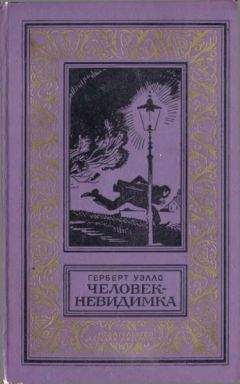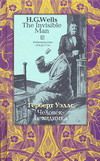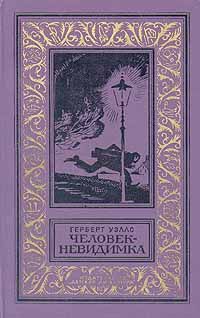H. Wells - Английский язык с Г. Уэллсом "Человек-невидимка"
steward [`stjHqd], iron [`aIqn], circumstance [`sq:kqmstxns]
Mr. Wicksteed was a man of forty-five or forty-six, steward to Lord Burdock, of inoffensive habits and appearance, the very last person in the world to provoke such a terrible antagonist. Against him it would seem the Invisible Man used an iron rod dragged from a broken piece of fence. He stopped this quiet man, going quietly home to his midday meal, attacked him, beat down his feeble defences, broke his arm, felled him, and smashed his head to a jelly.
Of course, he must have dragged this rod out of the fencing before he met his victim — he must have been carrying it ready in his hand. Only two details beyond what has already been stated seem to bear on the matter. One is the circumstance that the gravel pit was not in Mr. Wicksteed’s direct path home, but nearly a couple of hundred yards out of his way.
The other is the assertion of a little girl to the effect that (вторая /деталь/ — следующее утверждение маленькой девочки; to the effect that — втомсмысле, что; следующегосодержания), going to her afternoon school (шедшей в школу), she saw the murdered man “trotting” in a peculiar manner across a field towards the gravel pit (она видела, как убитый странным образом «трусил» через поле по направлению к гравийному карьеру; to trot — идтирысью/олошади/; спешить, торопиться). Her pantomime of his action suggests a man pursuing something on the ground before him (ее пантомима его действий наводила на мысль = потому, каконаэтоизобразила, можнобылоприйтикзаключению, что он преследовал /движущееся/ что-то по земле перед ним) and striking at it ever and again with his walking-stick (время от времени ударяя по этому предмету тростью). She was the last person to see him alive (девочка была последней, кто видел его живым). He passed out of her sight to his death (он пропал из ее вида, /шагнув/ навстречу смерти), the struggle being hidden from her only by a clump of beech trees (борьбу скрыла от нее лишь небольшая группа буков; clump — заросли /деревьев, кустарников/; группа/деревьев/) and a slight depression in the ground (и ложбинка; slight — легкий, небольшой; depression — понижение местности, низина, впадина, углубление).
Now this, to the present writer’s mind at least (эти подробности, по крайней мере, по мнению пишущего эти строки), lifts the murder out of the realm of the absolutely wanton (убирают убийство из области совершенно беспричинного = делают убийство не столь беспричинным; to lift out — поднимать; удалять, убирать). We may imagine that Griffin had taken the rod as a weapon indeed (можно допустить, что Гриффин действительно взял прут в качестве оружия), but without any deliberate intention of using it in murder (но без какого-либо преднамеренного умысла = ненамереваясьиспользоватьегодляубийства). Wicksteed may then have come by (Уикстид мог проходить мимо) and noticed this rod inexplicably moving through the air (и заметить, что прут непонятным образом движется в воздухе; inexplicably — необъяснимо, непостижимо). Without any thought of the Invisible Man (без какой-либо мысли о Невидимке) — for Port Burdock is ten miles away (поскольку Порт-Бердок находится в десяти милях /от этого места/) — he may have pursued it (он, вероятно, погнался за ним).
school [skHl], pantomime [`pxntqmaIm], pursuing [pq`sjHIN], realm [relm]
The other is the assertion of a little girl to the effect that, going to her afternoon school, she saw the murdered man “trotting” in a peculiar manner across a field towards the gravel pit. Her pantomime of his action suggests a man pursuing something on the ground before him and striking at it ever and again with his walking-stick. She was the last person to see him alive. He passed out of her sight to his death, the struggle being hidden from her only by a clump of beech trees and a slight depression in the ground.
Now this, to the present writer’s mind at least, lifts the murder out of the realm of the absolutely wanton. We may imagine that Griffin had taken the rod as a weapon indeed, but without any deliberate intention of using it in murder. Wicksteed may then have come by and noticed this rod inexplicably moving through the air. Without any thought of the Invisible Man — for Port Burdock is ten miles away — he may have pursued it.
It is quite conceivable that he may not even have heard of the Invisible Man (весьма вероятно, что он даже не слышал о Невидимке). One can then imagine the Invisible Man making off (далее можно допустить, что Невидимка стал убегать) — quietly in order to avoid discovering his presence in the neighbourhood (бесшумно, чтобы не обнаружили его присутствие в этой округе), and Wicksteed, excited and curious (а Уикстид, взволнованный и любопытный), pursuing this unaccountably locomotive object (погнался за этим необъяснимо движущимся объектом) — finally striking at it (и в конечном счете ударил по нему).
No doubt the Invisible Man could easily have distanced his middle-aged pursuer under ordinary circumstances (несомненно, Невидимка легко мог убежать от преследователя средних лет = немолодогопреследователя при обычных обстоятельствах; to distance — оставитьпозади, обогнать), but the position in which Wicksteed’s body was found suggests (но положение, в котором найдено тело Уикстида, наводит на мысль о том) that he had the ill luck to drive his quarry into a corner between a drift of stinging nettles and the gravel pit (что он имел несчастье загнать своего противника в угол между зарослями жгучей крапивы и карьером; quarry — каменоломня; добыча; преследуемый зверь; drift — дрейф; сугроб, нанос; большая цветочная клумба; множество цветов). To those who appreciate the extraordinary irascibility of the Invisible Man (тем, кто знает о необычайной вспыльчивости Невидимки; to appreciate — ценить; приниматьвовнимание; понимать), the rest of the encounter will be easy to imagine (легко представить остальное: «остаток встречи»).
discovering [dIs`kAvqrIN], locomotive ["lqukq`mqutIv], quarry [`kwOrI], irascibility [I"rxsq`bIlItI]
It is quite conceivable that he may not even have heard of the Invisible Man. One can then imagine the Invisible Man making off — quietly in order to avoid discovering his presence in the neighbourhood, and Wicksteed, excited and curious, pursuing this unaccountably locomotive object — finally striking at it.
No doubt the Invisible Man could easily have distanced his middle-aged pursuer under ordinary circumstances, but the position in which Wicksteed’s body was found suggests that he had the ill luck to drive his quarry into a corner between a drift of stinging nettles and the gravel pit. To those who appreciate the extraordinary irascibility of the Invisible Man, the rest of the encounter will be easy to imagine.
But this is pure hypothesis (однако это чистое предположение). The only undeniable facts — for stories of children are often unreliable (единственные несомненные факты, так как рассказы детей часто недостоверны/ненадежны; torely— полагаться) — are the discovery of Wicksteed’s body, done to death (обнаружение тела убитого Уикстида; todotodeath— убить), and of the blood-stained iron rod flung among the nettles (и запачканного кровью железного прута, брошенного в крапиву; tofling). The abandonment of the rod by Griffin, suggests (оставление прута Гриффиным наводит на мысль о том = очевидно, Гриффин бросил прут потому; toabandon— покидать, бросать; отказываться от) that in the emotional excitement of the affair (что /находился в эмоциональном/ волнении из-за этого происшествия/был взволнован этим инцидентом), the purpose for which he took it (от цели, для которой он взял его) — if he had a purpose — was abandoned (если у него была цель, он отказался; toabandon— покидать, оставлять; отказываться /от чего-либо/, прекращать /что-либо, делать что-либо/). He was certainly an intensely egotistical and unfeeling man (конечно, он был очень эгоистичным и бесчувственным), but the sight of his victim, his first victim (но вид его жертвы, его первой жертвы), bloody and pitiful at his feet (окровавленной и жалкой, /лежавшей/ у его ног), may have released some long pent fountain of remorse (мог освободить долго заключенный фонтан раскаяния = пробудить в нем раскаяние; pent — заключенный, запертый) which for a time may have flooded whatever scheme of action he had contrived (которое отложило: «затопило» на некоторое время придуманный им план действий).
After the murder of Mr. Wicksteed (после убийства мистера Уикстида), he would seem to have struck across the country towards the downland (он, вероятно, направился в сторону холмистой местности; downland— холмистая безлесая местность). There is a story of a voice heard about sunset by a couple of men in a field near Fern Bottom (рассказывают, что два человека слышали на закате какой-то голос в поле у Ферн-Боттом). It was wailing and laughing, sobbing and groaning (он причитал и смеялся, плакал и стонал), and ever and again it shouted (а иногда: «постоянно и снова» вскрикивал). It must have been queer hearing (должно быть, странно и необычно было это слышать: «это должно было быть странным слышаньем»). It drove up across the middle of a clover field and died away towards the hills (голос пронесся посреди клеверного поля и замер, направляясь к холмам).



